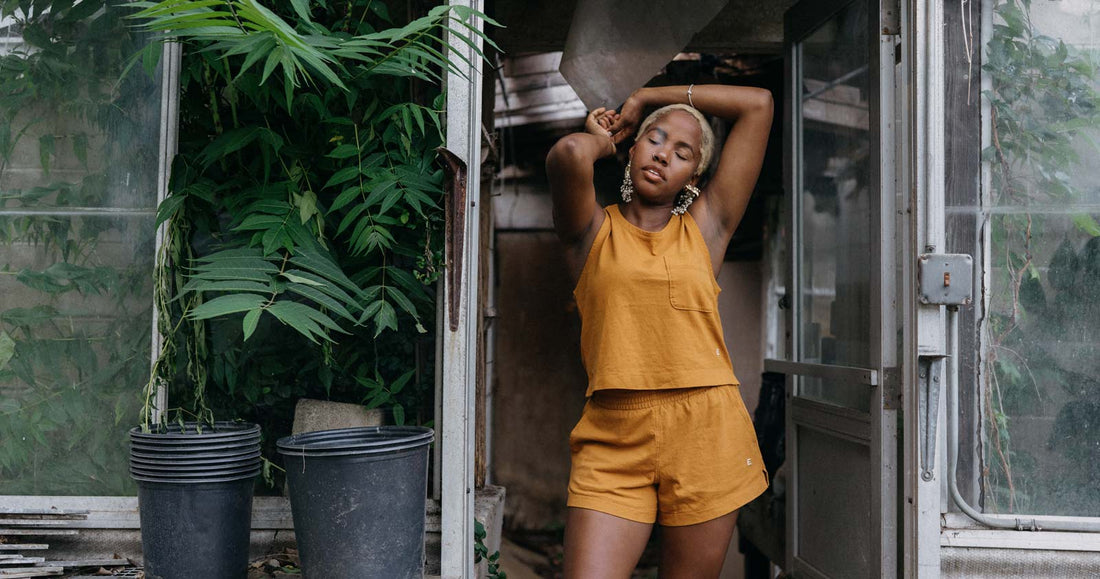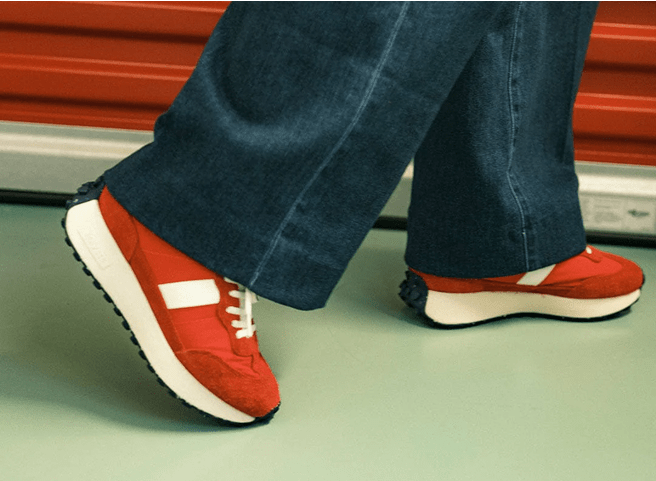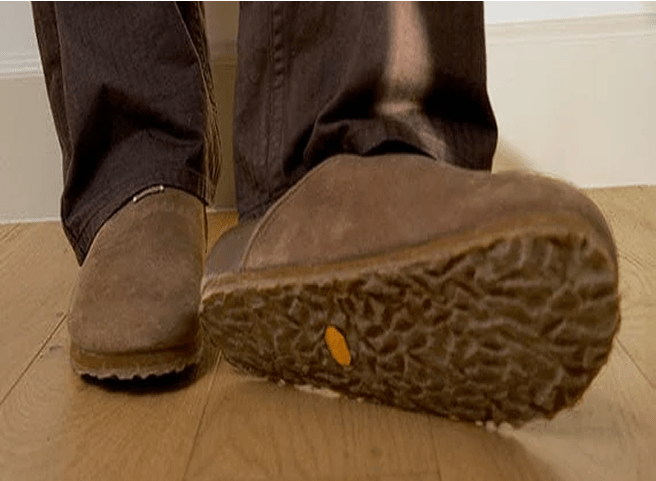Daydreamer Series: On Reinvention and Starting A Revolution
Christa Barfield is doing more than growing produce with her Philadelphia-based farming operation, FarmerJawn — she’s addressing food insecurity by reimagining the corner store.

Walking elegantly in a royal-blue silk dress, the backdrop a sprawling Elizabethan-style mansion and a palmful of sunflowers in hand, Christa Barfield looks more model-on-duty than farmer. At least until she takes off at a full sprint through the field, hands waving wildly above her. A trio of white-tailed deer freeze in place, clumps of lettuce hanging from their mouths, before leaping effortlessly over the electric fences that were supposed to be protecting the produce.
“These damn deer are eating all of my crops!” Christa exclaims, wiping sweat from her forehead. “I need to figure out how to keep them out of here.”
“Figuring it out” is a daily task for Christa at the helm of FarmerJawn, her impressive enterprise that includes a five-acre farm at Philadelphia’s historic Elkins Estate, two operational greenhouses, a 103-member CSA program, an herbal-infused tea brand, a gardening store, and a nonprofit that provides agricultural education for the next generation of Black and brown farmers. For the former healthcare administrator, taking care of people and planet is at the heart of everything she takes on — including her dream of redefining the corner store to be a place where food-insecure families can discover the connection between soil, sustenance and sovereignty. “Farming is dope,” says Christa. We couldn't agree more.
As told to SeaVees. Photography by Johnie Gall.

“Science was always my thing. I loved CSI, mystery novels, Sherlock Holmes — as I’m saying this now I realize I was such a dork [laughs]. I was part of a Girl Scout camp that introduced us to different medical careers — we’d travel around visiting hospitals and morgues and that’s where I met a doctor who showed me a leg that had been cut because of necrosis. I was like, ‘Yep, this is what I’m doing with the rest of my life!’
I chose biology as my major in college but had to leave the program because it was extremely difficult and I was a mother to two children by then. I just didn’t have the bandwidth. I stayed in healthcare by becoming an administrator, working the overnight shift at a hospital registering babies into our system as they were born. Eventually I had a team of people under me and took care of the business side of a medical practice, making sure doctors were making their dollars. Understanding insurance was my speciality, and I still had a level of patient care and was reading anatomy terms, so I felt close to science. I didn’t really have a dream for myself at the time, I just wanted to excel at something and I definitely did that. But I was burnt out.
“When you leave your job, people always ask you what’s next and expect you to have an answer.”
I quit on a whim. I got to work, sat down at my computer, and read an email that I just couldn’t get with. This was January 2, 2018, a day when most people have this whole plan for their new year, and here I was writing my resignation letter. I wasn’t focused on what was next, I just wanted peace in that moment. I was able to quit without fear because I knew I could keep my home and my car with the income I was making by driving Uber and renting my home on Airbnb. Being part of that gig economy gave me the confidence to take control of my life.


When you leave your job, people always ask you what’s next and expect you to have an answer. But maybe it’s best to just slow down and ask questions first. I thought I’d go back to school, but I ended up booking a flight to the Caribbean on a whim and it completely changed the trajectory of my life. One of my Airbnb hosts was a Thai chef and I remember watching him pluck fresh herbs from his garden to make my tea. My other host sent me to work with his son one evening, and I helped fill boxes of produce for the local CSA. I watched as people of all colors and demographics came to pick up their food, slipping 20 euros in a white envelope. It hit me just how fast I had been moving for so long. It took me coming all the way to this island and watching a man pick up a plant and put it in a cup to realize for the first time that food and farming were connected.
When I got home from my trip, I grabbed any book I could find on herbs and botanical gardens and began putting together ideas of what a growing business could look like. Around that time, I met a man at the gym (in the middle of the day, which never would have happened if I’d still been at my job) and we started dating. He bought me my first greenhouse for Mother’s Day. He saw me and this dream and he invested in it, and I launched my tea company in 2019.

I had also pulled my daughter out of school — I’ve lived in an area of Philly called Germantown my whole life, but my mom had put me in a all-Black private school that gave me opportunities that others in that community didn’t have and I wanted to change the shape of my own daughter’s life by homeschooling her. As one of her field trips, we visited a nature center in Philadelphia and I discovered there were these organic community gardens behind it — more than 200 acres tucked away in the city. My mom invested in 1260-square-feet with me, I posted on Facebook I would be growing enough produce for 10 families, and by January of 2020 I was offering CSA shares to people in my neighborhood. That was the start of FarmerJawn, and a new dream of feeding my community with healthier food.
There aren’t many Black farmers — something like one-percent of farms are Black-owned. There’s also a lot of trauma in working the land for Black people. I didn’t realize how deep it goes, but I’ve thought a lot about my heritage, my ancestors losing their land. It still happens in Black communities in farming — for me, I was renting greenhouses from a man who promised to install heat before the winter. As the weather got colder, there was still no heat. I bought these huge pieces of plastic to try and insulate my crops and protect my seeds. I lost everything. I put out a message to my community and asked them to help us stay there — the greenhouses just had so much promise, so much potential. We raised $12,000 but it went like water. I’d lost all my crops so there was no money coming in and I still had to pay this man rent. I remember standing in my office and counting out cash to my staff, struggling just to stay afloat. The landlord told me I lied to my community and stole their money when really I’d been the one who was lied to — it was such a demeaning experience that I finally realized I had to leave this place. It felt like being exiled from my dream.
"I felt so powerless, but there was no quitting because I knew this was bigger than me. What, I’m going to just give up? I have too much pride for that."
I felt so powerless, but there was no quitting because I knew this was bigger than me. Food insecurity is such a major issue and I knew I could make real changes. I could literally impact an entire city by growing food organically and teaching others to do the same. And what, I’m going to just give up and disappear? Nah, I have too much pride for that.


I came up with this idea of ‘redefining the corner store.’ Most food-insecure families in the city rely on their corner bodega for food — what if these stores were stocked not with chips and cheesesteaks but with healthy, nutrient-dense food options grown right in nearby microfarms, planted and managed by the communities that rely on them? This is what farming needs to be. This is what true health looks like. This is people knowing where their food comes from. This is farming as convenience. This is my new dream and people are paying attention — for the first time, the Department of Agriculture invited me to speak with their team, and I received a grant from the state to bring it into fruition.
There’s this rhetoric that farmers are poor, but it’s just not true. You can work in agriculture and make a very good living — why else would Black and brown people have been pushed off their land but still used for labor? Food is powerful for Black and brown people, the ways we cook and share it. It’s historical. Martin Luther King, Jr. spoke about how Black folks were removed from their land so it could be enterprised, and how it was time for us to return to land ownership. It gives me so much fire to do this work — I see it was a continuation of one of his dreams. That’s why I started an urban agro-preneur cohort, to teach people that organic farming is a sustainable business model that’s profitable and scalable, and good for people and the planet.

I deal with my own imposter syndrome sometimes, but when I find out I have access to new land, it brings new purpose and possibility. A few months after losing those greenhouses, I found out I’d gotten access to land and greenhouses at an estate close to the city. Now, we’re going to be the first certified-organic farm of that size in Philadelphia that’s also Black-and woman-led.
"If something doesn’t make sense to me, I’m not doing it. Maybe that’s stubbornness, but it’s gotten me this far."
If you Google the words ‘farmer owner,’ you’re probably going to get an entire screen full of white men. Maybe there’s one white woman in there, but your search page is going to look like that American Gothic painting [laughs]. When I’ve achieved what I want to achieve, you’re going to see a Black woman from Philadelphia in her hoop earrings on that search result page. Representation is so important because it means the revolution has come. It means we’re finally revering history and putting food back in the hands of the people. It’s not only about race, it’s about changing the lifestyles of all urban people.


Things are rarely easy, but I find a lot of joy in this work. Right now I have to rely on Uber to get around because my truck needs more love than I can wait for it to receive [laughs]. My tractor doesn’t work so we have to do everything by wheelbarrow, using our legs. Only one of my greenhouses is operational. Being an entrepreneur, I don’t have the luxury of not being able to work — the other week I twisted my ankle and had to keep farming on my crutches. When I want to do something, I’m going to do it. If something doesn’t make sense to me, I’m not doing it. Maybe that’s stubbornness, but it’s gotten me this far — I’ve been doing this for four years and I’m doing okay and can’t wait to elevate to the next level.
“Give yourself the autonomy and time to think through who you really are. Abandon the things that aren’t serving you.”
My dream for others is for them to realize how strong they are, and then to utilize the power of community to execute their dreams. If you have dope skills and I have dope skills, putting them together is going to have a major impact. If anyone wants to know more about farming, email me because my true joy is helping people who have the spark. Now is literally the best time to go all in on your dream. You can figure out alternative ways to support yourself in the gig economy if you want to quit your job. Give yourself the autonomy and time to think through who you really are. Abandon the things that aren’t serving you. Once you do that, you’ll show up as the best, most authentic version of yourself.”
Christa wears the Sixty Six Sneaker and Huntington Middie from the SeaVees x Jungmaven collection. Also pictured are the Bolinas Boot.


